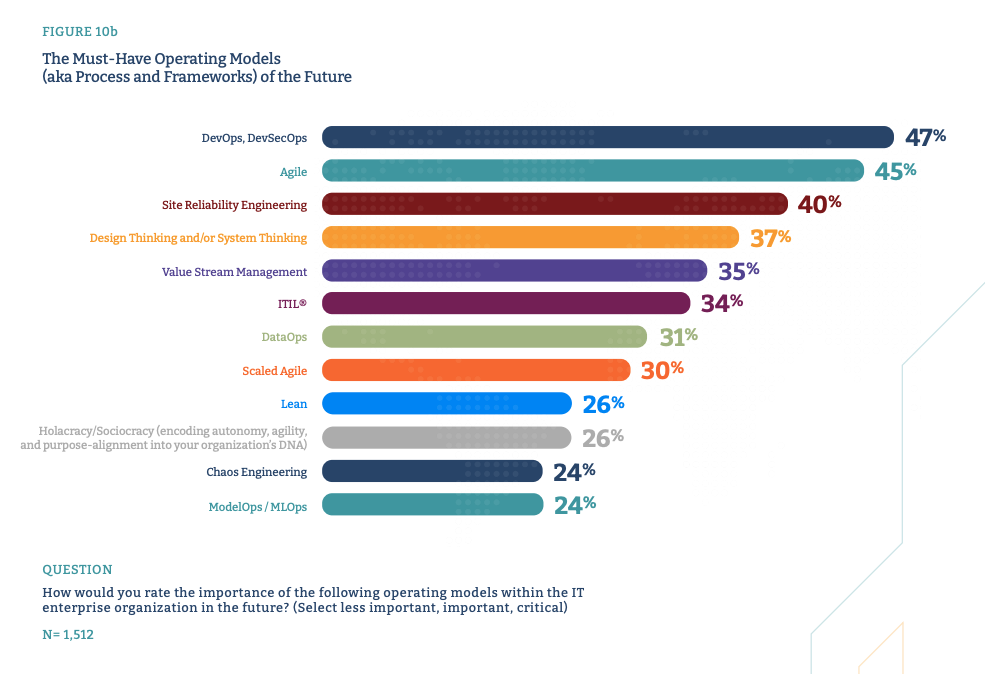In this technology-driven world, skills have a very limited shelf life. The knowledge, tools and resources we rely on in the moment rarely stay relevant or useful forever – especially with rapidly changing demands. Hard enough as it is, meeting these demands only gets more difficult when organizations have insufficient skilled resources, i.e., talent and skills gaps.
Knowing this, how do IT organizations stay afloat? What can be done to help their teams and individuals be successful? DevOps Institute argues that they must make a culture of continuous learning, upskilling and reskilling a top strategic priority. But as DevOps Institute points out, that process starts with understanding what skills are needed today, tomorrow and in the future.
A key part of an upskilling and reskilling strategy, according to DevOps Institute, is understanding “must-have skills.” That’s exactly what they set out to do in their “Upskilling IT Global Report 2022 ”
For three years, DevOps Institute has conducted its “Upskilling IT Report” to identify which human, process, function and automation skills are considered “must-haves” for IT organizations. Now in its fourth year, DevOps Institute’s Upskilling IT Global Report 2022 examines DevOps upskilling and recruiting trends for enterprise IT organizations worldwide. For the first time, the study offers four distinct reports: the Global Report, Americas Regional Report, EMEA Regional Report and APAC Regional Report.
Taken from over 2,500 responses across 120 countries, the 2022 Upskilling IT Report covers everything from “challenges that shape IT transformation,” “the truth about upskilling in global IT organizations” and a “range of skills capabilities” including human and technical skills capabilities.
As a gold sponsor this year we’ve included four key findings from the global Upskilling IT 2022 Report for your information:
1. Insufficient IT resource skills are a major challenge across the globe
In the report, DevOps Institute found that forty percent (40%) of survey respondents say that the resource and skill shortage is one of their top three challenges today – above both budget and funding issues and managing and/or avoiding technical debt.
2. Addressing technical debt must be paired with addressing talent debt
DevOps Institute stresses in its report that, while technical skills are a must-have skill priority, technology without human skills will not accelerate innovation and transformation. “If the pipeline of new talent entering the IT industry can’t keep up with rising demand and rising retirements,” they note, “then upskilling is the only viable talent debt remediation strategy.” Additionally, “employee demographics, expectations and current situations will impact productivity in the long run.”
3. Upskilling is a professional and organizational imperative
According to a study conducted by Salesforce in April 2021, 72% of workers claim they’d be more engaged with work if their company increased investments in training, while 69% believe they’d be happier with their work. DevOps believes there is more to an upskilling imperative beyond keeping employees happy about the amount of training they receive. In its 2022 Upskilling IT Report, DevOps Institute maintains that continuous learning must be foundational for leaders and individuals.
Making these skills a priority requires a mind-shift for leaders and individuals - adopting a continuous learning frame of mind, not just allocating a budget for training activities. This also means leaders providing vital learning experiences through feedback. The best thing you can do is make every day at work an upskilling experience. Things like making your upskilling journey intentional, thinking beyond the now and welcoming feedback from all groups are places DevOps Institute encourages you to start.
4. SRE is among the top three must-have operating models of the future
When asked which skill capabilities are the most important, fifty-seven percent (57%) of survey respondents selected process and framework skills. What’s more, site reliability engineering (SRE) is among the top three operating models along with DevOps, DevSecOps and Agile, outranking many other vital practices such as Design Thinking and System Thinking, Value Stream Management and ITIL.
Moreso, when asked to rate the importance of the must-have operating models (as a part of process and framework skills) within future IT enterprise organizations, forty percent (40%) of respondents said SRE is a must-have operational framework.

5. Improving IT Operations and Systems and Modernizing Infrastructure and Applications are among the top three priorities
Market research firms like Gartner and IDC all agree on one thing: the market will continue to move towards cloud, containers, smart infrastructure, artificial intelligence and machine learning. In line with that, when CIOs were asked what their top priority is for 2022, they said 43% of their time will be spent improving IT operations and systems and 40% of their time will be focused on modernizing infrastructure and applications.
Though most of the report delves into DevOps topics, there is some mention of observability, since DevOps and observability can be joined at the hip in many companies. For example: The more time and energy is spent on modernizing and improving systems and infrastructures, the more fine-grained these systems often become. A strong observability practice is crucial to get clear insights into the state and behavior of these dynamic, fast-moving systems.
As you’ve read above, DevOps Institute’s Upskilling IT Report provides an array of insights into skills training for IT departments. Because sufficient IT resource skills are a challenge for businesses, it’s important companies address technical debt, understand that upskilling is a professional and organizational imperative, as well as consider SRE as a must-have operating model.
Since the last Upskilling IT Report, DevOps Institute noticed a twenty percent (20%) increase in respondents who said that their organization has a formal upskilling (training) program. We all need to see that number increase for 2023. It can be part of a core retention strategy.
If you’re looking for more reasons to dive deeper into this report, don’t worry—there are way more. Downloading the 2022 Upskilling IT Global Report can help you:
Understand the skill gaps within IT organizations today
Review the top must-have skill categories
Assess each skill category to see how you compare
Take action in your skills department
But don’t just take our word for it – download the 2022 Upskilling IT Global Report and see the value for yourself!



